'The real campaign begins': Quebec's 43rd general election starts
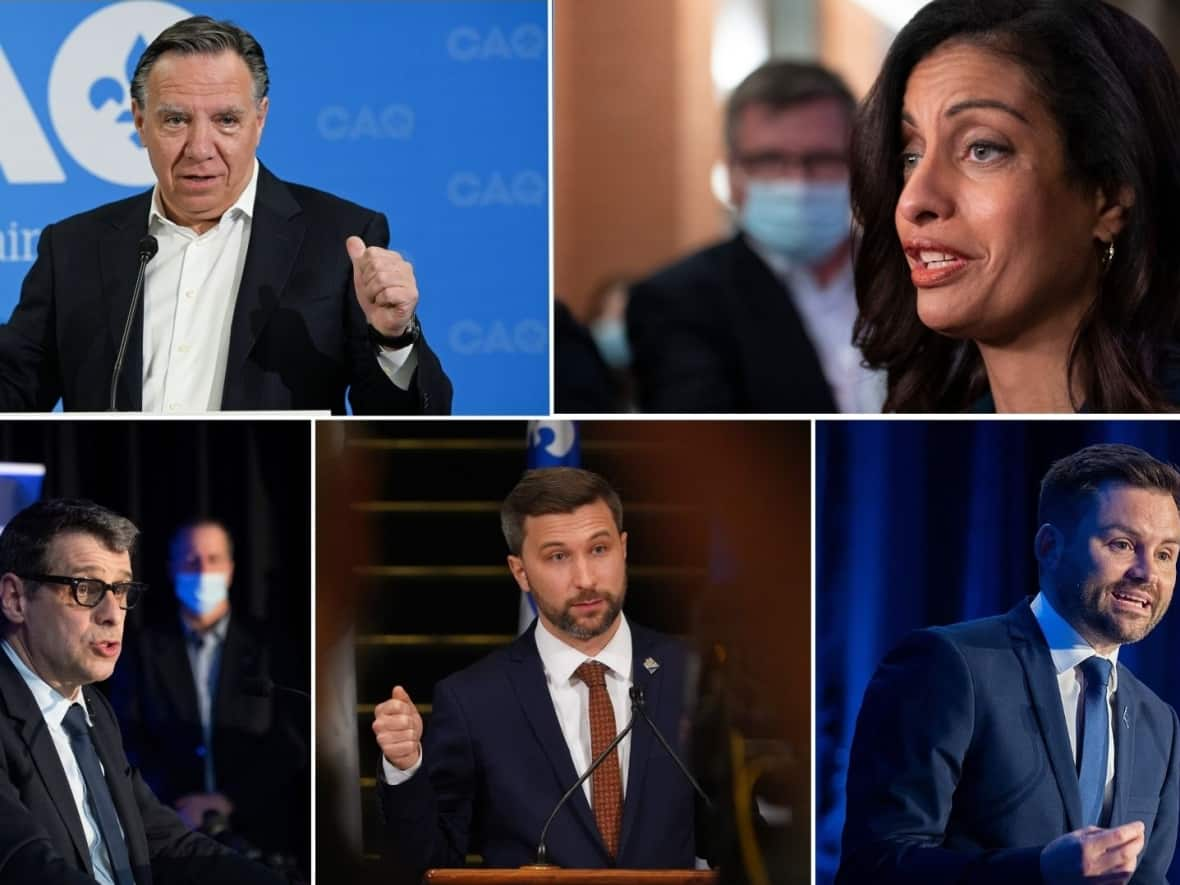
Quebec's 43rd general election has officially kicked off.
Coalition Avenier Québec (CAQ) Leader François Legault made the announcement Sunday morning after asking Lt.-Gov. Michel Doyon to dissolve the legislature.
"The real campaign begins," Legault said while making his way to his campaign bus.
Election signs are already up in cities across the province. The campaign will last about five weeks before Quebecers head to the polls on Oct. 3.
Party leaders are swinging into full gear, making appearances in several ridings throughout the day.
The Quebec Liberals and Legault's CAQ were the first parties to hold news conferences, launching their campaigns Sunday morning.
Parti Québécois (PQ) Leader Paul St-Pierre Plamondon then spoke in the Montreal riding of Camille-Laurin, followed by Conservative Party of Quebec Leader Éric Duhaime in his riding of Chauvreau, northeast of Quebec City.
Québec Solidaire (QS) is launching its campaign in the riding of Saint-François in the Eastern Townships, where it hopes to make gains this election.
All the major party leaders have named candidates and made election promises in recent weeks.
Polls suggest the CAQ holds a commanding lead as the campaign kicks off, and is widely expected to cruise to a second majority.
The economy was one of the main topics addressed by the party leaders as they launched their campaigns.
Liberal Leader Dominique Anglade said the economy would be the ballot-box question and suggested the subject of Quebec's economic growth had been neglected by the CAQ.
"Ask any Quebecer if they are better off today than they were four years ago, and they'll answer the question by no," Anglade said.
"The reality is people don't have as much money in their pockets. We need a long-term plan, and those are the proposals that we have."
Economy top of mind
At a news conference in front of the Montmorency Falls outside Quebec City soon afterward, Legault said he's proud of the state of Quebec's economy, but acknowledged inflation was the number one concern voters had shared with him in his travels throughout the province recently.
"The salaries in Quebec have never increased more quickly, so can we agree that there's something good for our workers right now?" he said. "Who do you really trust to manage your wallet?"
He also mentioned more than once that in his time as premier, Quebec had reduced its wealth gap with Ontario.
He addressed Anglade's charge about the economy, saying in French, "How could this madame say Quebec's economy isn't doing well? We never saw Quebec's economy outgrow Ontario's under the Liberals."
Legault went on to say that, "The labour shortage wasn't caused by the CAQ."
WATCH | Quebec heads to the polls in October:
Anglade soon tweeted in response that, "My name is Dominique."
Legault said the CAQ would share its four measures to address the cost of living in the coming days, and that it would include concrete ways to turn the province's economy green, including measures to fight climate change and reduce greenhouse gas emissions.
Legault's launch in the capital city suggests his party wants to shore up its base in the region, where the Conservatives under Duhaime appear to be gaining popularity.
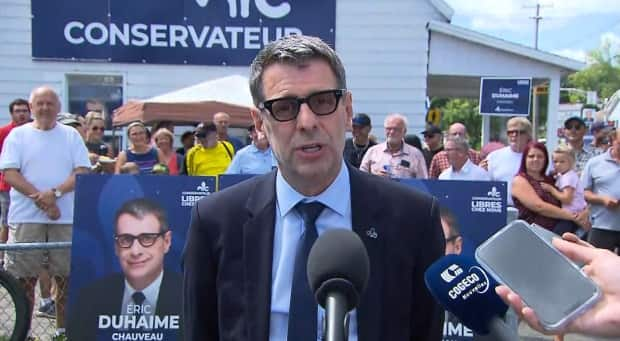
In response to whether Duhaime threatened CAQ strongholds in Quebec City and the Beauce area, Legault said the pandemic had taught him the importance of remaining humble and that he told his team every day, "Don't take anything for granted."
He said he believed the Conservatives' growing popularity could be attributed in part to backlash to pandemic restrictions, but that he felt it had been his duty to implement at times strict measures to protect vulnerable people.
A Léger poll published earlier this month found support for Legault's party at 44 per cent, compared to 18 per cent for the second-place Quebec Liberals. Québec Solidaire and the Conservative Party of Quebec polled at 15 per cent and 13 per cent, respectively.
Growing Conservative popularity
Duhaime held his news conference in front of a small crowd of supporters, saying his campaign had started a week ago without waiting for Legault to give the go-ahead.
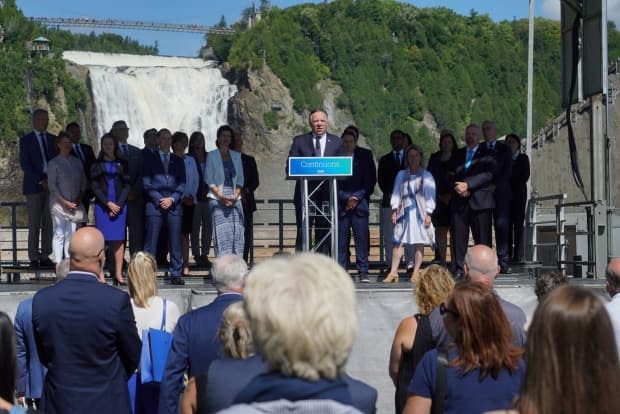
He said the fact that his party had already amassed 125 candidates for the first time in a Quebec election was a win.
"I can sense a lot of enthusiasm and a very strong mobilization on the part of our base and we have 36 days to convince hundreds of thousands of other Quebecers," Duhaime said.
Health, housing and climate change
Québec Solidaire (QS) is positioning itself as the main opposition to the CAQ, trying to take advantage of the Liberals' drop in the polls.
Gabriel Nadeau-Dubois, QS co-spokesperson, said the upcoming mandate is Quebec's "last chance" to combat climate change.
"We have a responsibility to act now," he said. "The first priority should be people's health and the environment's health."
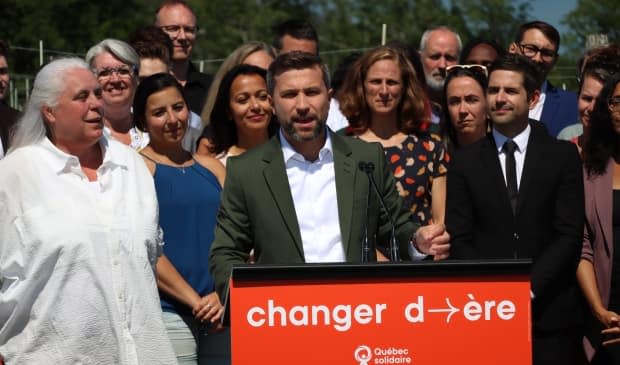
He said his party would present an ambitious platform that would solve the housing crisis, "revolutionize" transportation and make Quebec "one of the greenest countries in the world," referring to QS's support for sovereignty.
"We'll put an end to the biggest polluters getting a free pass."
In Montreal, Plamondon said his party could be the election's Cinderella story — "The team that will have gotten a lot further than what everyone predicted."
Despite the PQ's bleak polling results, Plamondon said the party would be relying on a platform based on the authenticity of its convictions.
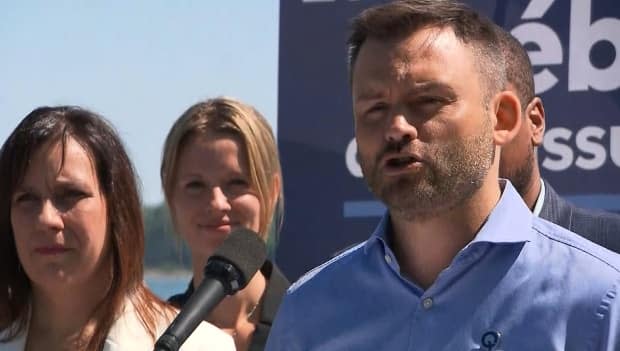
"Before the decline Canada has chosen for us, we do not accept the CAQ's invitation to resign ourselves. We choose hope and rigour," Plamondon said, alluding to the CAQ's position that Quebec doesn't need to separate from the rest of Canada to assert its sovereignty.
"Simply put, to be a sovereigntist is to be a realist," Plamondon said. "We want to make sure that everybody understands that this idea is also and primarily about our future as a nation and the future of the French language."
As the legislature broke for the summer, Legault's party had 76 seats, while the Quebec Liberals had 27, Québec Solidaire had 10 and the Parti Québécois had seven. The Conservative Party of Quebec held one seat and there were four Independents.


